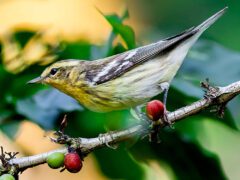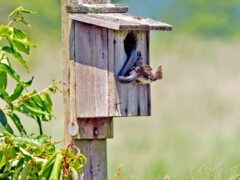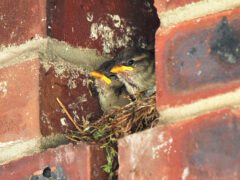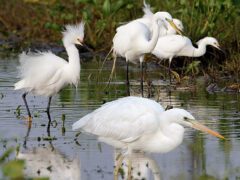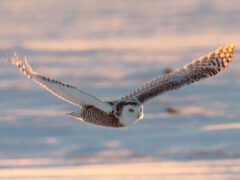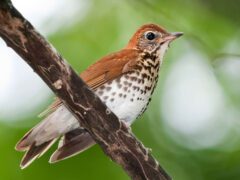Chuck-will's-widow Similar Species Comparison
Main SpeciesChuck-will's-widow
Adult
Large, flat-headed nightjar. Upperparts are mottled brown, buff, and black. In flight, males flash thin stripes of white on the tail. Males and females do not flash white in the wing.
© Kathy Doddridge / Macaulay LibraryFlorida, April 23, 2019Adult female
Flat-headed nightjar with a long tail and long, pointed wings. Females have a buffy spot on the tips of the outer tail feathers.
© Simon d'Entremont / Macaulay LibraryNova Scotia, May 23, 2019Adult
Roosts during the day on a branch or on the ground. Tends to roost in the same location night after night.
© Brad Walker / Macaulay LibraryLouisiana, March 28, 2016Adult
Extremely well camouflaged. Often roosts on the ground or tree branch during the day.
© David Hollie / Macaulay LibraryGeorgia, May 20, 2007Adult
Incessantly sings its name at night.
© Gregory Griffith / Macaulay LibraryJune 01, 1992Similar SpeciesEastern Whip-poor-will
Adult
Eastern Whip-poor-will is smaller and grayer than Chuck-will’s-widow. Whip-poor-will's outer tail feathers have white tips, visible when the tail is spread in flight. Chuck-will’s-widow shows white only on the inner half of these feathers, so the tail appears much less white overall.
© Daniel Murphy / Macaulay LibraryIllinois, May 11, 2016Similar SpeciesCommon Pauraque
Adult male
Common Pauraques have prominent white on the outer tail feathers and white slashes in the wings, visible in flight that Chuck-will's-widows do not have. They also have a longer tail.
© Paul Tavares / Macaulay LibraryCayo, March 05, 2015Similar SpeciesCommon Nighthawk
Adult
Common Nighthawks have white slashes on the wings in flight that Chuck-will's-widows do not have. When perched, nighthawks have a smaller head and often choose a more conspicuous perch.
© Daniel Irons / Macaulay LibraryMaryland, August 23, 2016Compare with Similar Species
Click on an image to compare
Species in This Family
Nightjars and Allies(Order: Caprimulgiformes, Family: Caprimulgidae)
More to Read
Don't miss a thing! Join our email list
The Cornell Lab will send you updates about birds,
birding, and opportunities to help bird conservation.










